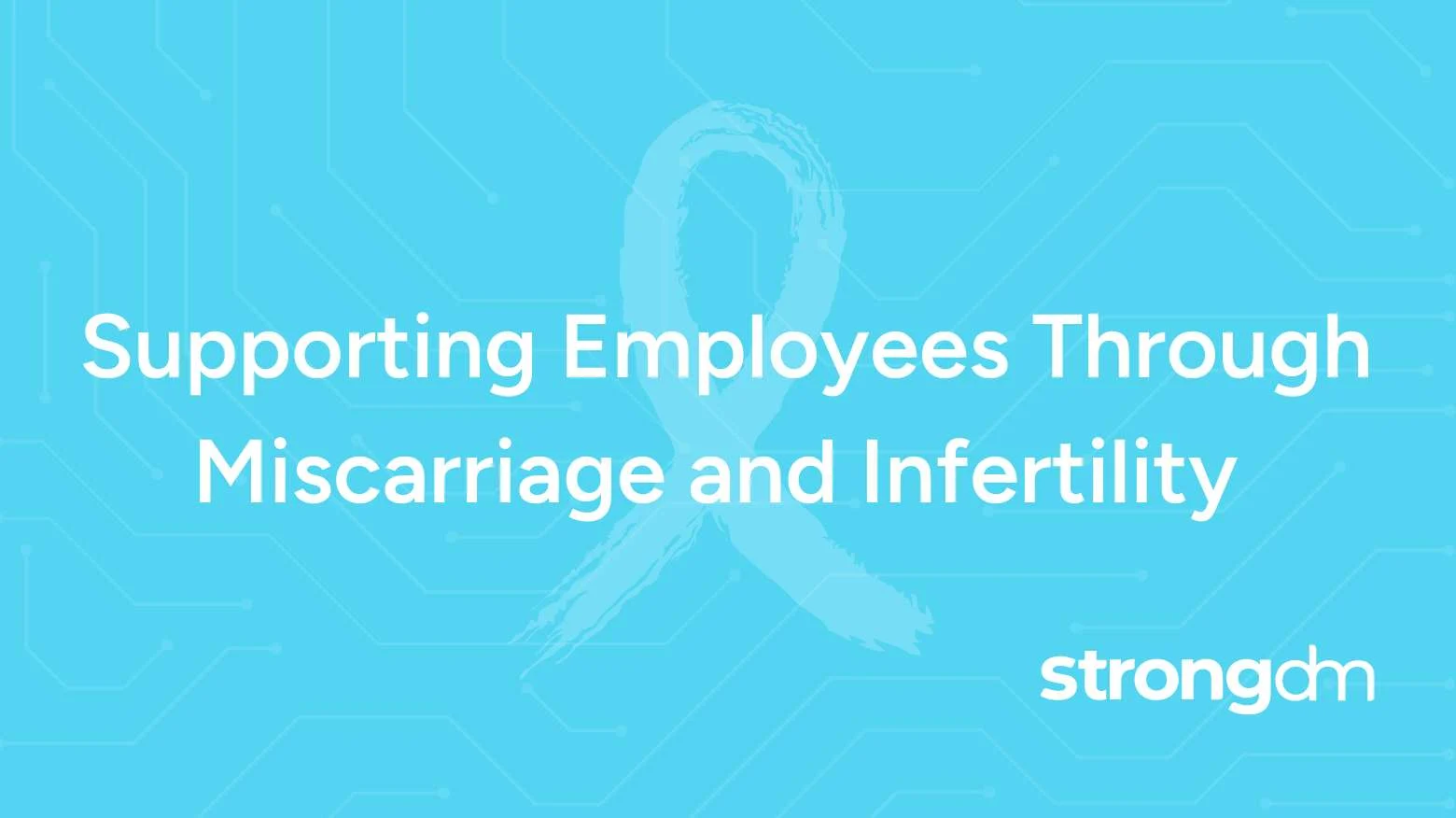
- Role-based, attribute-based, & just-in-time access to infrastructure
- Connect any person or service to any infrastructure, anywhere
- Logging like you've never seen

World Infertility Awareness Month takes place every June to raise awareness about infertility and the hardships that come with it. According to a new report from the World Health Organization, an estimated 1 in 6 people globally are affected by infertility. Yet, despite the prevalence of these issues, many workplaces still do not have adequate policies to support their employees during these times.
Sick Time Alone Doesn’t Cut It
Infertility and miscarriage are deeply personal and painful experiences that affect millions daily. Sick time, while helpful, isn't enough for individuals and families dealing with infertility and miscarriage.
These experiences are not the same as a cold or flu, requiring much more than a few days off to recover. Instead, individuals need time to heal emotionally and physically, seek medical treatment, and process their grief.
Stigmas Compound Stress
The stigma surrounding infertility and miscarriage often prevents individuals from speaking out about their experiences and seeking the support they need. In a workplace that lacks adequate compassionate leave policies, employees may feel pressured to hide their struggles and return to work before they are ready physically or emotionally.
Many women feel pressured to move on quickly—even women in the C-suite. Our Chief Marketing Officer, Michaline Todd, shared her experience with returning to work immediately following a loss:
"Having worked in male-dominated industries most of my career, there's often this pressure for women to feel as though they need to squelch all emotions about their loss and get back to work as fast as possible. At previous companies, I've personally experienced that. As much as I tried to convince employees that I'm okay with them taking the time they need—there was always the concern that the company culture would look down on it."
Financial Impact of Loss and Infertility
Experiencing a miscarriage and enduring infertility can be devastating for individuals and couples. While the emotional toll is immeasurable, there are also financial implications associated with pregnancy loss and infertility. According to Health, the average cost of care for a miscarriage in the United States ranges from $709 to $15,149. For some, it’s much more. Medical expenses, including diagnostic tests, consultations, and hospital procedures, can accumulate quickly. Moreover, additional costs may arise from genetic testing, counseling services, and potential fertility treatments.
The cost of infertility treatments can be substantial, posing a significant financial burden to individuals and couples. According to the American Society for Reproductive Medicine, the average cost of one in vitro fertilization (IVF) cycle in the United States is approximately $12,000, and multiple cycles may be required.1 Additional expenses such as medications, diagnostic tests, and fertility preservation can further escalate the overall cost.
By acknowledging the emotional and financial impact of miscarriages and infertility and providing supportive measures, companies can foster a more empathetic and understanding workplace.
How Can Employers Help?
Given the impact of infertility and pregnancy loss on employee well-being, companies can play a vital role in supporting their employees by designing benefits packages with these circumstances in mind. Companies should implement compassionate leave policies that provide adequate time off for physical and emotional recovery from pregnancy loss and infertility.
Offering flexible work arrangements is another way to help ease the burden on employees. This helps them navigate treatments, procedures, and doctor visits without worrying about lost time or commuting hurdles. Flexible work arrangements also include the ability to work from home, adjust work hours, flex time, or take a temporary leave of absence.
The most robust benefits packages also include insurance coverage for fertility treatments, access to resources, and education about fertility and family-building options. Offering employee assistance programs that include grief counseling, access to support groups, and resources on coping with loss can be invaluable.
Building a Culture of Support
Providing compassionate leave is a significant first step, but it isn’t always enough. Companies should also work to foster a culture of support and understanding for employees dealing with infertility and miscarriage. This may include offering access to counseling services and educating managers and employees about the realities of infertility and miscarriage. At a minimum, it means having candid conversations about the challenging issues our people face.
Support at StrongDM
As a people-first organization, we have a responsibility to support our employees during times of hardship. StrongDM helps individuals experiencing infertility and loss of pregnancy through flexible schedules, a remote work model, one month of paid pregnancy loss leave for either parent and a people-first culture.
Michaline said it best, “I'm so happy to be at StrongDM now, where our culture supports families through all their disparate journeys."
By implementing compassionate leave policies for individuals experiencing infertility and miscarriage, companies destigmatize infertility and loss and demonstrate a genuine commitment to the well-being of their workforce.
Sources
Tong, S., Kaur, A., Walker, S. P., & Bryant, V. J. (2005). Miscarriage: Rates, risk factors, and outcomes in a multi-ethnic community. Australian and New Zealand Journal of Obstetrics and Gynaecology, 45(6), 505-507.
About the Author
Angela Donlan, Content Manager, Angela supports the marketing team by developing creative content that helps StrongDM tell its story in creative and authentic ways. Experienced in the advertising agency space and the consulting world, Angela spent her early career years serving as a client-facing writer and project manager for brands large and small. Her specialties range from brand development and strategic campaign planning to social media execution and long-form content production. Angela obtained her Bachelor of Science in Business Administration from the University of Tulsa. She majored in Marketing and Management and completed minors in Advertising and Communications during her time at TU. To contact Angela, visit her on LinkedIn.

You May Also Like





